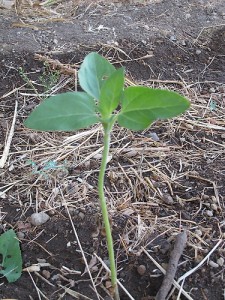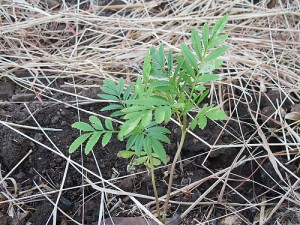A beautiful and proud, but probably very guilty, neighborhood rooster
TEOPANTLI KALPULLI – I was watering my wilted sunflower seedlings when the first rains came. First one fat drop, and then two, and then a whole scattering. I laughed and ran to shut off the faucet, delighted that I had been wrong. I’d listened to the rolling thunder in the distance with wry skepticism. Better water those seedlings, I said to myself, the scant handful that had survived this week’s scorching sun. Maybe that will make it rain. And then it did.

The first rains in six months – I relished the exhilaration, the feel of the delicious drops falling on my face, pearly orange sky, rolling thunder in the distance. And then I remembered. Shades of Hiroshima, thousands dead, millions exposed to the assassin molecules that hover in the air in the wake of a nuclear disaster. I recalled what Marisol, the little girl next door, had said about the first rain: “When the rains come, they will be radioactive, and anybody who eats the fruit from the trees will get cancer,” she reported. I stopped smiling and ran for cover.
Official government reports on the fallout from the nuclear disaster in Japan are reassuring; the only hard data I am finding online, however, confirm that the rains reaching our side of the Earth are testing for radiation at levels higher than what the EPA considers safe. So, what to do?
I’m affected very directly by this decision; because I’m without a car these days, I didn’t bring a lot of groceries with me to my home, which is far from any supermarket or even a tienda where I can buy vegetables. I was counting on supplementing my diet with the chaya leaves from the bushes outside my house, and the herbs in my garden. And while there’s no way to know whether this rain carries toxic levels of radioactivity from Japan, there’s no doubt it carries a load of toxins, after six months’ accumulation, from Guadalajara’s factories and the industrial agricultural operations that surround our little ecovillage.
I called my dear friend Nirtana, a doctor and practitioner of holistic healing. Her message: Celebrate the rain. Eat the vegetables. Have a good attitude. Spirit transforms matter.
“You take care of the Earth and the Earth will take care of you,” she said. “Bless it, apologize to it, and pray: ‘May this food be only of benefit to me and those I love.’ Our attitude and calling on the Divine has the ability to transform and transmute toxins. Act from your heart, sing, dance, love.”
I awake to a newly enlivened Kalpulli. The fresh, damp earth breathes with an indescribable medley of scents – sage, grasses, aromatic pine and the damp soil itself embrace me with their chaotic blend of fragrances. The birds seem particularly celebratory. The rainy season has begun. Just a week too late for the seedlings Marisol and I had tended so carefully and lovingly for nearly a month, and then transferred to the soil with great hopes, only to watch as the sun wilted them into oblivion.
I reflect on the urgency I felt to plant seeds this spring. After a year of travel, of constant, peripatetic movement, one of my strongest desires was to plant some seeds. Figuratively – in the sense of building relationships with people and places, giving them time to take root and grow, flower and bear fruit. But also I wanted to plant literal seeds – to place them in the soil and water them, to cultivate and nurture them to maturity. It’s a rite that connects me back to my mother, to my grandfather, to my great-grandmother Esta, to ancestors long before her, directly to the mother of us all, our Mother Earth.
The planting of the seeds was a weekend-long project; finding the seed boxes, lining them with plastic, mixing the soil, creating little biodegradable pots with paper, finding a way to splice the hoses so they would reach to the planting table, calling Marisol and the other neighbor children to participate. It felt wonderful. I made arrangements with Marisol to water the seedlings in my absence, which she faithfully did.
My wandering soul had not yet settled enough to pull it off, it seems. My work has me transferring to the other side of the city for most of the week, staying there during the week to avoid a daily two-hour commute, and returning home on the weekends – when I don’t have a trip to make, which all too often, I do. I would call Marisol and her mother, Maite, from the road, and they would give me seedling progress reports. The cilantro was doing well; the Swiss chard was growing profusely. Sunflowers and fennel and marigolds abounded.
Sadly, Marisol greeted me upon my return with some bad news: the chickens had attacked the chard, and not much was left of their tiny leaves. Still, I thought, they had a chance at survival; chard is notoriously hardy.
But transferring those seedlings to the soil proved to require more attention and care than we were able to give, so most of them perished. I’m left with one cilantro, two marigolds and six hardy sunflowers.
Now the rainy season has begun, but it’s time to travel again.
Soon, I will dare to plant seeds again. It’s a crazy act of faith – with my hectic travel schedule – but something inside me compels me to do it again and again. Next time, I think, as farmers before me have thought every season, next time will be different.
Postscript: Scratch the lone cilantro. It seems a chicken made off with its tender leaves late yesterday or early this morning. Only the marigolds and sunflowers remain.
Growing food is harder than one might imagine….
Postscript two: Scratch the sunflowers…. as of now, two hardy souls remain…. and speaking of scratching, I hear the chickens doing so now.
Sigh… time to buy some chicken wire, I suppose.

Leave a Reply